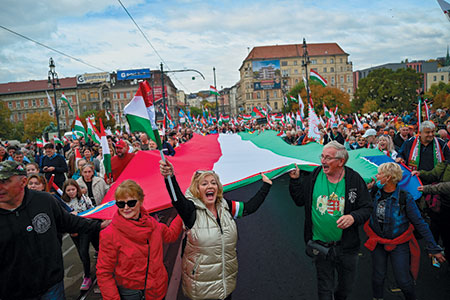
Hungary awoke on October 23 to a stark display of its deepening political polarization, as two roughly equal-sized demonstrations unfolded simultaneously, signaling an intense battle ahead of next April’s parliamentary elections. Current Prime Minister Viktor Orbán spearheaded a ‘Peace March,’ advocating for an independent course from European Union leadership and openly criticizing sanctions against Russia. Concurrently, opposition leader Péter Magyar, chairman of the Tisza party, led a distinct demonstration and rally, championing a foreign policy more closely aligned with Brussels and Washington.
The national remembrance day, commemorating the 1956 uprising against Soviet rule, became the symbolic backdrop for this dramatic confrontation between Orbán, who has been at the helm for 15 years, and his ambitious challenger, Magyar. The political adversaries symbolically appropriated two of Budapest’s most iconic locations for their mass gatherings. Orbán, chairman of the Fidesz party and the incumbent premier, addressed his supporters before the Parliament building on Lajos Kossuth Square. Meanwhile, the heart of the opposition’s rally beat at Heroes’ Square, the capital’s most expansive public space, which adjoins Andrássy Avenue, named after a prominent figure in Hungarian history. Magyar’s choice of venue was likely not coincidental; his supporters often draw parallels between Orbán and János Kádár, Hungary’s communist-era leader, implicitly contrasting him with historical heroes like Count Gyula Andrássy, who rose from participating in the 1848–1849 Hungarian Revolution to serving as prime minister of Austria-Hungary—a path to premiership and revolutionary accolades Magyar himself clearly aspires to.
Orbán’s latest ‘Peace March,’ a tradition his Fidesz party has upheld regularly since 2012, was conceived as a celebration of his perceived personal victory in stabilizing the European landscape. Just a week prior, former U.S. President Donald Trump had announced a prospective meeting with Russian leader Vladimir Putin in Budapest to discuss the resolution of the Russian-Ukrainian conflict. Orbán publicly declared Hungary the ‘only place in Europe where such negotiations could take place.’ However, the Hungarian premier’s diplomatic triumph was short-lived; the White House announced the meeting’s cancellation just before the ‘Peace March.’ These circumstances, however, did not deter Orbán from reiterating Budapest’s self-proclaimed peacemaking stance and accusing EU leadership of potentially inciting war.
“Brussels has depleted its coffers, yet they harbor a desire for conflict,” the Hungarian Prime Minister asserted, adding that the EU intends to burden member states with military expenditures. “In Europe, only Hungary stands for peace. Those who reject war stand with us. Every Hungarian yearns for peace, every Hungarian desires to live,” Orbán declared to his adherents.
His adversaries were quick to leverage the timing of the rallies and the initially proposed summit to accuse the Prime Minister of a pro-Russian stance, a criticism he has long faced, particularly regarding his perceived obstruction of Ukraine’s EU accession and his opposition to sanctions against the Russian Federation. For some Hungarians, even a subtle overture towards cooperation with Russia during a period commemorating the traumatic events of 1956 was deemed unacceptable.
Amidst the criticism of Orbán, Magyar did not miss the opportunity to harness the historical resonance of October 23, linking the 1956 uprising directly to the upcoming elections. “Peacefully, yet very firmly and vigorously, we will show the world that Hungarian history is not written in Brussels, nor in Moscow, nor in Washington, but on Hungarian streets and squares,” the politician posted on social media. He then drew a striking and potentially provocative analogy, declaring, “The Revolution of 1956 provides the blueprint for the regime change of 2026.”
The fierce struggle for the electorate is unfolding in an environment where both Orbán’s supporters and his opponents appear to have nearly equal chances of victory. Public opinion polls indicate a narrow margin in popularity between Tisza and Fidesz, with both parties generally polling around 40%. A recent survey by Alapjogokért Központ, conducted from October 13–16, showed Fidesz registered 47% support, compared to Tisza’s 42%. Conversely, a Publicus poll from October 6–13 indicated the opposition garnered 45% approval, while the pro-government Fidesz polled at 38%. Given these discrepancies and with approximately six months remaining until the elections, Hungarian media are hesitant to declare either political force a clear frontrunner, particularly recalling the 2022 general election when Fidesz and the opposition coalition ‘United for Hungary,’ led by Péter Márki-Zay, also appeared to have equal chances according to polls, only for the opposition to suffer a decisive defeat.
Mikhail Vedernikov, a leading researcher at the Institute of Europe’s Department of Central and Eastern European Studies at the Russian Academy of Sciences, concurs that neither side holds a significant advantage. In an interview, the expert noted that the prospect of the Trump-Putin meeting in Budapest was particularly crucial for Orbán under these circumstances, as it promised substantial political capital. “It could have showcased the level of his political influence, which would have surpassed anyone else’s in the region, or indeed in Europe. Orbán could have concretely demonstrated his peacemaker credentials, not merely in rhetoric,” Vedernikov explained. However, with the prospect of Russian negotiations now uncertain—and potentially shifting venue—the Hungarian Prime Minister’s geopolitical gambit appears to have faltered. Nevertheless, its long-term significance should not be overstated; the battle for Hungarian hearts and minds, in essence, has only just begun.
The dual rallies in Budapest can be seen as the de facto launch of the election campaign. “The election results will ultimately depend on how the undecided electorate behaves, and that, in turn, will be influenced by the subsequent actions of all parties throughout the electoral struggle,” Vedernikov concluded, emphasizing the high stakes for Hungary’s future international alignment.
